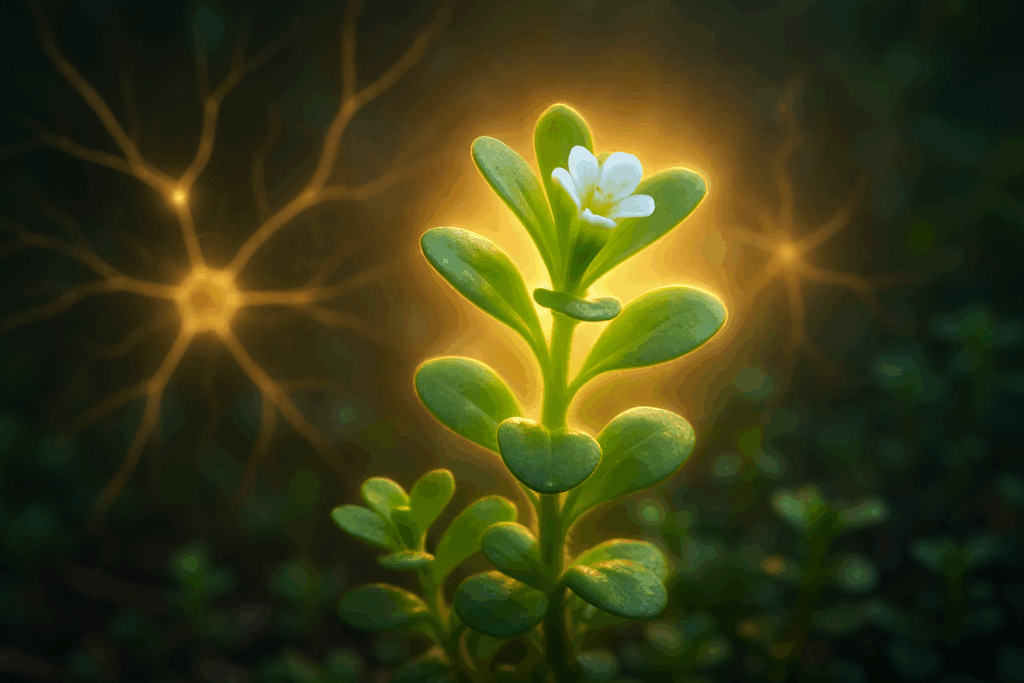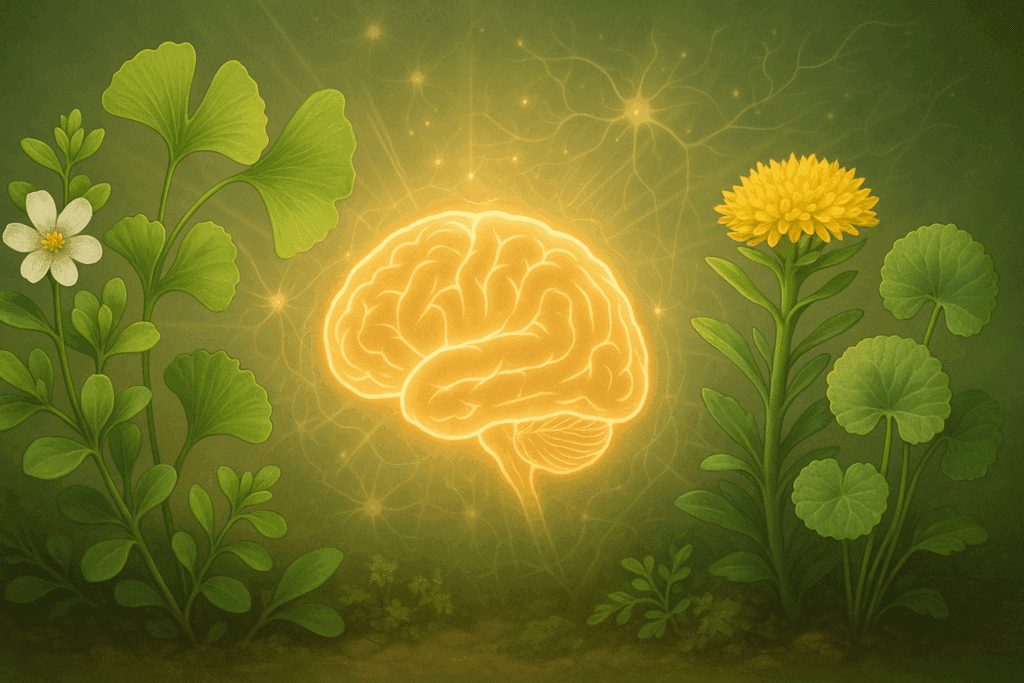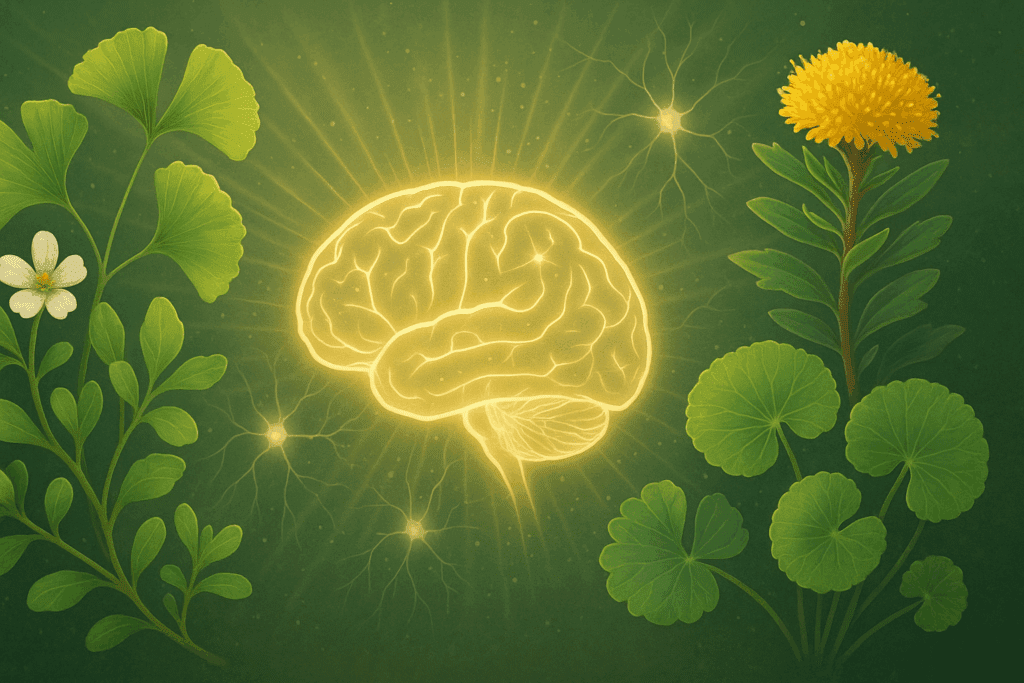Introduction: Exploring Natural Solutions for ADHD and Brain Health
Attention Deficit Hyperactivity Disorder (ADHD) is a complex neurodevelopmental condition that affects millions of individuals across the globe, from childhood into adulthood. While conventional treatments such as medication and behavioral therapy are often recommended, there is a growing interest in exploring complementary, natural approaches to support focus, memory, and overall cognitive wellness. Herbs, in particular, have gained attention for their potential role in boosting attention and calming hyperactivity, offering a more holistic route to better brain health. In this article, we will delve deeply into the best herbs for ADHD, examining the evidence behind their effectiveness, understanding their impact on cognitive function, and considering how they align with broader strategies for how to improve brain health and achieve better brain health naturally.
You may also like: Where to Buy Bacopa Monnieri: How to Find Quality Supplements for Cognitive and Memory Support
Our exploration will not only highlight individual herbs but will also discuss the biological mechanisms they influence, the scientific studies supporting their use, and practical advice on how to incorporate these botanicals into a brain-healthy lifestyle. Along the way, we will ensure that each recommendation is grounded in evidence, promoting a thoughtful, medically responsible approach to cognitive enhancement.

Understanding ADHD and Its Impact on Brain Health
Before we explore herbal remedies, it is crucial to understand the cognitive challenges associated with ADHD. Characterized by difficulties in maintaining attention, impulsivity, and hyperactivity, ADHD has profound effects on academic, professional, and social functioning. Research indicates that ADHD is linked to dysregulation in neurotransmitter systems, particularly dopamine and norepinephrine, which are essential for executive function, working memory, and emotional regulation.
Given the complexity of ADHD, strategies aimed at managing symptoms must focus on what helps brain function at a fundamental level. This means enhancing neurotransmitter balance, improving neuronal connectivity, and supporting neuroplasticity—the brain’s ability to adapt and form new neural pathways. Consequently, identifying the best things for brain health is vital not only for mitigating ADHD symptoms but also for promoting cognitive resilience over the lifespan.
Why Look to Herbs? Natural Ways to Boost Brain Health
Herbal remedies have been used in traditional medicine systems for centuries to enhance mental clarity, stabilize mood, and support memory. Today, modern research is increasingly validating many of these traditional claims, showing that certain herbs can significantly influence the same neurotransmitter systems implicated in ADHD. Furthermore, many herbs are rich in antioxidants and anti-inflammatory compounds that help protect brain cells from oxidative stress, a critical factor in achieving better brain health.
In considering how to increase brain cells naturally and what helps the brain function optimally, herbs offer a compelling complement to conventional treatments. They work gently, often with fewer side effects, and can be incorporated into broader lifestyle strategies that prioritize nutrition, exercise, sleep, and stress management—the “3 things the brain needs” most to thrive.
Bacopa Monnieri: The Ancient Herb for Modern Cognitive Support
Bacopa Monnieri, a staple of Ayurvedic medicine, is often cited as one of the best herbs for ADHD and cognitive enhancement in general. This adaptogenic herb has been studied extensively for its ability to improve attention, processing speed, and memory—all areas of difficulty for individuals with ADHD.
Bacopa works by modulating neurotransmitter activity, particularly serotonin and dopamine, and by supporting antioxidant defenses in the brain. Studies have shown that Bacopa can help manage brain function by reducing oxidative damage to neurons and promoting the growth of new synaptic connections. In this way, Bacopa directly addresses how to increase brain cells naturally, making it an excellent choice for those seeking to boost brain health.
Additionally, Bacopa’s calming effects can help regulate hyperactivity and anxiety, two common co-occurring symptoms of ADHD. Regular supplementation with Bacopa, under medical guidance, may offer a natural, evidence-based path to better brain health without the need for stimulant medications.

Ginkgo Biloba: Enhancing Circulation and Cognitive Function
Ginkgo Biloba, one of the oldest living tree species, has a long history of use in traditional Chinese medicine for improving memory and mental clarity. Its extracts are rich in flavonoids and terpenoids, which are powerful antioxidants that protect brain cells from oxidative stress.
One of Ginkgo’s most well-documented effects is its ability to enhance cerebral blood flow, thereby delivering more oxygen and nutrients to the brain. This mechanism is crucial for supporting the best things for brain health, particularly in individuals with cognitive impairments. Improved blood flow helps neurons perform their functions more efficiently and may aid in the management of ADHD symptoms by enhancing overall brain function.
Furthermore, Ginkgo has been studied for its ability to modulate neurotransmitter systems, including dopamine and norepinephrine, which are central to attention and emotional regulation. In this sense, Ginkgo addresses what helps the brain on a biochemical level, making it a valuable herb for those seeking natural support for ADHD.
Rhodiola Rosea: Building Resilience to Stress and Boosting Brain Energy
Rhodiola Rosea, often referred to as “golden root,” is another adaptogenic herb renowned for its ability to enhance physical and mental resilience. In the context of ADHD, Rhodiola’s benefits are particularly compelling because it supports the body’s stress response, improves mental stamina, and promotes emotional stability.
Chronic stress is a significant contributor to impaired brain function, and learning how to manage brain stress responses is key to sustaining focus and cognitive performance. Rhodiola has been shown to reduce levels of cortisol, the body’s primary stress hormone, while boosting the production of neurotransmitters like serotonin and dopamine.
By enhancing mitochondrial function and reducing mental fatigue, Rhodiola plays a direct role in how to improve brain health over time. Its neuroprotective effects also contribute to how to increase brain cells naturally, creating an internal environment conducive to better brain health and more effective ADHD management.
Panax Ginseng: Energizing the Mind and Body
Panax Ginseng, often called “true ginseng,” is well known for its invigorating effects on both mental and physical energy. Ginseng has been studied extensively for its cognitive benefits, including improvements in memory, attention, and executive function.
One of the ways Ginseng supports brain health is by modulating the hypothalamic-pituitary-adrenal (HPA) axis, helping the body manage stress more effectively. Since stress can exacerbate ADHD symptoms, using Ginseng to manage brain resilience offers a proactive approach to cognitive health.
Additionally, Ginseng’s ginsenosides—bioactive compounds unique to the plant—have been shown to enhance synaptic plasticity and neurogenesis. This aligns perfectly with strategies focused on how to increase brain cells naturally and sustain better brain health into adulthood. Incorporating Panax Ginseng into a holistic ADHD support plan can therefore offer tangible cognitive benefits rooted in traditional wisdom and modern science.
Gotu Kola: Nurturing Calm and Cognitive Clarity
Gotu Kola, another powerful herb from the Ayurvedic tradition, is sometimes called “the herb of longevity.” Known for its calming and clarifying properties, Gotu Kola has been traditionally used to enhance meditation, memory, and overall cognitive clarity.
Scientific studies have revealed that Gotu Kola promotes the growth of dendrites and axons, the parts of nerve cells responsible for transmitting signals. In this way, it directly supports how to increase brain cells naturally and what helps brain function most effectively. Additionally, Gotu Kola improves circulation, further enriching the brain with oxygen and essential nutrients.
For individuals with ADHD, Gotu Kola’s ability to promote a calm yet alert state makes it particularly valuable. By reducing anxiety without sedation, it supports the brain’s natural rhythms, aligning with the best things for your brain when managing attention and focus challenges.
Lemon Balm: Calming the Mind and Enhancing Focus
Lemon Balm, a member of the mint family, has long been prized for its soothing effects on the nervous system. Traditionally used to relieve stress, promote sleep, and ease anxiety, Lemon Balm’s benefits extend naturally to the management of ADHD symptoms.
Research shows that Lemon Balm can enhance GABA activity in the brain, promoting relaxation without impairing cognitive function. This is vital for individuals seeking better brain health because it allows the brain to enter a more focused and receptive state without the fogginess associated with sedative medications.
Moreover, Lemon Balm has mild cholinergic effects, meaning it can help improve memory and concentration. This places it firmly among the best things for brain health, particularly for those struggling with the distractibility and restlessness characteristic of ADHD.
Ashwagandha: Stress Reduction and Cognitive Restoration
Ashwagandha, another cornerstone of Ayurvedic medicine, is well-known for its profound adaptogenic properties. Often used to combat stress, Ashwagandha also offers significant cognitive benefits, making it a valuable herb for ADHD support.
Studies suggest that Ashwagandha can reduce cortisol levels, enhance antioxidant defenses in the brain, and even promote the regeneration of neuronal connections. This is critical for individuals interested in how to improve brain health and how to increase brain cells naturally.
Ashwagandha’s neuroprotective and restorative effects are particularly important for maintaining better brain health in the face of chronic stress and cognitive overload. Its ability to foster emotional resilience and mental clarity makes it a holistic tool for managing ADHD symptoms without reliance solely on pharmaceutical interventions.

Frequently Asked Questions About Herbs for ADHD, Focus, and Brain Health
1. Can herbs really help improve focus and memory in adults with ADHD?
While herbs are not a cure for ADHD, certain botanicals can play a significant role in cognitive support by enhancing neurotransmitter balance, reducing inflammation, and improving blood flow to the brain. Research increasingly shows that plants like Bacopa Monnieri and Ginkgo Biloba influence what helps brain function on a biochemical level. Regular use, combined with lifestyle practices focused on how to improve brain health, can amplify these benefits. Choosing brain healthy habits like exercise, stress management, and herbal supplementation forms a comprehensive approach to ADHD management. It’s important to work with a healthcare provider to personalize a plan that aims for better brain health over time.
2. How do herbs support the growth of new brain cells?
Some herbs, such as Lion’s Mane mushroom and Gotu Kola, contain compounds that stimulate neurogenesis, the process of growing new neurons. These plants encourage how to increase brain cells naturally by promoting nerve growth factor (NGF) production, a key protein needed for the maintenance and regeneration of neurons. Incorporating these herbs alongside a diet rich in omega-3 fatty acids, regular exercise, and good sleep hygiene can maximize your brain’s regenerative capacity. Understanding how to increase brain cells gives individuals a proactive way to protect cognitive function across the lifespan. Always remember that the best things for brain health involve a combination of supportive herbs and lifestyle choices.
3. Which daily habits pair best with herbal supplementation for ADHD?
Building a daily routine that supports cognitive function involves more than just herbs. Engaging in regular aerobic exercise, practicing mindfulness or meditation, and maintaining a nutrient-dense, anti-inflammatory diet are among the best things for your brain. Herbs can act as a powerful adjunct, but they work best when combined with a lifestyle that emphasizes how to improve brain health from multiple angles. Remember, the 3 things the brain needs most\u2014adequate oxygenation, proper nutrition, and mental stimulation\u2014are non-negotiable for sustainable cognitive enhancement. Adopting a holistic strategy can better manage brain challenges associated with ADHD and lead to long-term improvement.
4. Are there specific combinations of herbs that work synergistically for ADHD?
Yes, certain herbal combinations are thought to produce synergistic effects that boost brain health more effectively than using single herbs alone. For example, combining Bacopa Monnieri with Rhodiola Rosea may simultaneously enhance focus and emotional resilience, two critical areas for ADHD management. Understanding what helps the brain on multiple levels\u2014including neurotransmitter modulation, mitochondrial support, and stress hormone regulation\u2014is key to formulating an effective regimen. Synergistic formulas often aim to both manage brain fatigue and stimulate cognitive endurance. Always consult a knowledgeable practitioner to tailor herbal combinations safely and effectively.
5. How long does it typically take to notice improvements when using herbs for cognitive function?
The timeline for noticing cognitive improvements varies depending on the herb, the dosage, and the individual\u2019s baseline brain health. For adaptogenic herbs like Ashwagandha and Bacopa, noticeable effects typically emerge after consistent use for four to eight weeks. Patience is critical, as natural methods for how to improve brain health and boost brain health rely on gradual physiological changes rather than immediate symptom suppression. Users often experience cumulative benefits, such as sharper focus, greater emotional balance, and improved memory, over several months. Setting realistic expectations can help users stay committed to building better brain health through herbal support.
6. Are there lifestyle factors that can interfere with the effectiveness of brain-boosting herbs?
Absolutely. Poor diet, chronic stress, sleep deprivation, and sedentary behavior can all blunt the potential benefits of herbal interventions. Since how to improve brain health depends not just on supplementation but also on comprehensive lifestyle optimization, it\u2019s crucial to eliminate counterproductive habits. Managing stress, getting regular exercise, and nourishing the brain with antioxidants and healthy fats ensure that what helps the brain is fully supported. Lifestyle synergy magnifies the positive effects of herbs, creating a more favorable internal environment for cognitive growth. Ultimately, herbs are one part of a larger mosaic that determines how to increase brain cells naturally.
7. How do herbal remedies align with the latest scientific findings on neuroplasticity?
Modern neuroscience shows that the brain remains plastic and adaptable well into adulthood, meaning it can form new connections and pathways in response to learning and experience. Herbs like Panax Ginseng and Gotu Kola directly support neuroplasticity by enhancing synaptic transmission and reducing oxidative damage. By working with the body’s natural mechanisms, herbs align closely with emerging knowledge about how to boost brain health. Neuroplasticity thrives in environments rich in novelty, challenge, and support\u2014highlighting again that the best things for brain health involve both internal biochemistry and external behaviors. Harnessing the power of neuroplasticity provides a hopeful framework for ADHD management.
8. Can diet influence the effectiveness of herbs in boosting brain function?
Without question, diet profoundly impacts how effectively herbs can support cognitive function. Consuming foods rich in flavonoids, omega-3 fatty acids, magnesium, and antioxidants complements what helps brain function naturally. A nutrient-dense diet amplifies the brain healthy effects of herbs by reducing systemic inflammation and promoting optimal neurotransmitter synthesis. For individuals wondering how to increase brain cells naturally, combining a brain-boosting diet with herbal support can create a powerful synergy. Paying attention to blood sugar balance, hydration, and gut health also supports the brain\u2019s capacity to absorb and benefit from herbal nutrients.
9. Are there potential downsides or precautions when using herbs for ADHD?
While generally considered safe, herbs are not without risks, especially when used improperly or in combination with certain medications. Some herbs can interact with blood thinners, antidepressants, or other psychiatric medications, potentially affecting how to manage brain health safely. It\u2019s also essential to purchase high-quality, standardized extracts to ensure purity and potency. Consulting with a healthcare professional familiar with herbal medicine provides the safest route to leveraging the best things for your brain without unintended side effects. Personalization and monitoring are critical when embarking on any herbal regimen for cognitive support.
10. What emerging herbs show promise for ADHD and cognitive enhancement?
Recent research is exploring novel herbs such as Saffron, Centella Asiatica, and Lion\u2019s Mane mushroom for their cognitive-enhancing properties. These botanicals show promise in supporting memory, attention, and emotional balance, offering new avenues for better brain health. Scientists are particularly excited about compounds that stimulate brain-derived neurotrophic factor (BDNF), a key molecule for how to increase brain cells and enhance learning capacity. As research evolves, the catalog of options for what helps the brain is expanding, giving individuals more tools to manage brain challenges naturally. Staying informed about emerging trends can empower users to continuously refine and optimize their approach to brain healthy living.

Exploring Herbal Synergies for ADHD Management
While each herb offers unique benefits, combining certain herbs may produce synergistic effects that enhance overall outcomes. For instance, Bacopa and Ginkgo Biloba together may amplify improvements in memory and attention due to their complementary antioxidant and neurovascular effects. Pairing Ashwagandha with Lemon Balm may provide both stress reduction and focus enhancement, addressing multiple facets of ADHD simultaneously. Understanding these synergies is key to crafting a holistic approach to what helps brain function and achieve the best things for your brain.
Was this article helpful? Don’t let it stop with you. Share it right now with someone who needs to see it—whether it’s a friend, a colleague, or your whole network. And if staying ahead on this topic matters to you, subscribe to this publication for the most up-to-date information. You’ll get the latest insights delivered straight to you—no searching, no missing out.
Further Reading:
7 Best Herbs for Memory and Brain Health
5 Foundational Habits That Benefit ADHD Brains
Important Note: The information contained in this article is for general informational purposes only, and should not be construed as health or medical advice, nor is it intended to diagnose, prevent, treat, or cure any disease or health condition. Before embarking on any diet, fitness regimen, or program of nutritional supplementation, it is advisable to consult your healthcare professional in order to determine its safety and probable efficacy in terms of your individual state of health.
Regarding Nutritional Supplements Or Other Non-Prescription Health Products: If any nutritional supplements or other non-prescription health products are mentioned in the foregoing article, any claims or statements made about them have not been evaluated by the U.S. Food and Drug Administration, and such nutritional supplements or other health products are not intended to diagnose, treat, cure, or prevent any disease.


